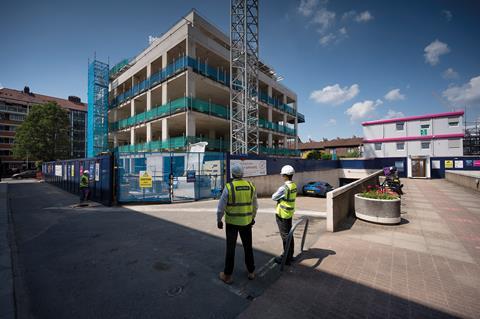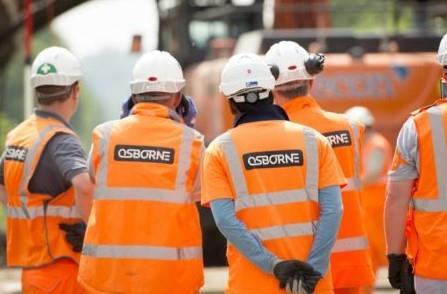Administrator details painstaking and long-standing effort to keep business set up in 1966 alive
A rescue deal with a would-be white knight for failed contractor Geoffrey Osborne collapsed in April at the last minute with the historic firm then forced to announce on the same day it was going into administration, an update from the firmŌĆÖs administrators has revealed.
RSM said Osborne, which was set up in 1966, had been having discussions throughout most of last year with ŌĆ£significant businesses in the industryŌĆØ about a sale but by November ŌĆ£none of the potential trade buyers had agreed to move forwardŌĆØ.
However, earlier this year a sale seemed on the cards with RSM saying Osborne had been close to striking a deal with one potential purchaser, which would have seen the unnamed firm take a majority stake in the business ŌĆō only for this to hit the buffers at the end of February.
Another bidder, who had already been looking at buying the firm, then ŌĆ£expressed real interest in acquiring the companyŌĆØ.

RSMŌĆÖs update, filed at Companies House this week, said OsborneŌĆÖs auditors would only sign off its delayed accounts for the year to March 2023 once ŌĆ£an agreed investorŌĆØ was lined up.
RSM, which had been originally brought in by Osborne in December 2022 to carry out a review of the business, said: ŌĆ£At this stage, there was still a reasonable expectation of being able to reach a deal with the trade purchaser and so it was agreed to defer the signing of the accounts to enable a deal to be concluded.ŌĆØ
But rumours about the health of the company began to spook the supply chain and RSM said: ŌĆ£The filing of the accounts became overdue, which caused uncertainty in the market.
ŌĆ£The public sector projects that the company was negotiating as preferred bidder had been very slow to get to contract and were further delayed as a result of this uncertainty. The further delays caused even greater uncertainty, which in turn increased pressure from the supply chain for payment.ŌĆØ
RSM added that ŌĆ£noise in the marketplace put additional strain on the cash flow, via an additional run on the companyŌĆÖs creditŌĆØ.
On 18 April, the would-be buyer decided it was only interested in a ŌĆ£limited number of [Osborne] projects. As the projects they did not wish to take forward were forecasting a cash outflow over the next few months, it became clear that there was no viable future for [Osborne].ŌĆØ
RSM said a notice of intention to appoint an administrator was filed by Osborne later that day.
Administrators added the ongoing delays in signing off OsborneŌĆÖs accounts further undermined confidence in the firm because auditors ŌĆ£were not able to provide a going concern sign off which in turn prevented the securing of new contracts which were predicated on the accounts being filed. Regrettably, the company faced a profound ŌĆśCatch-22ŌĆÖ situation.ŌĆØ
RSM said Osborne first ran into serious problems following the covid-19 lockdown in March 2020 with the firmŌĆÖs construction business having to shut a number of sites in London as a result.
ŌĆ£This resulted in significant delays to completion of projects. The JCT form of contract did not allow for compensation for these delays and thus the delays had a very significant impact on the construction divisionŌĆÖs financial performance.ŌĆØ

RSM said that in order to cover losses from its construction business, Osborne ŌĆ£acceleratedŌĆØ the sale of if its infrastructure business ŌĆō which it had decided to sell back in 2016 ŌĆō ŌĆ£to ensure that there were sufficient cash reserves to enable the group to survive its losses in constructionŌĆØ.
The infrastructure business was eventually sold in September 2021 to private equity having ŌĆ£absorbed a great deal of management time, which meant focus on other areas of the group was diminishedŌĆØ.
That month, former Wates COO Dave Smith joined as a non-executive director with, RSM said, ŌĆ£a view to bringing his construction expertise to help support the ailing construction businessŌĆØ.
But RSM added it ŌĆ£very quickly became apparent that the full quantum of losses in construction was significantŌĆØ. The then chief executive Andy Steele left in November and was replaced by Smith while the finance director, Stuart Hammond, also stepped down and was later replaced the following year by former Laing OŌĆÖRourke finance director Peter Duff ŌĆ£who brought an immediate and increased focus on cash and cost reductionŌĆØ.
Having sold infrastructure, RSM said OsborneŌĆÖs plans to move into the development and BTR markets were ŌĆ£torpedoedŌĆØ by Liz TrussŌĆÖs mini-Budget in September 2022 which ŌĆ£negatively affected market sentiment in the construction sector generallyŌĆØ.
Two months later, in November, finance firm Woodford Tradebridge told Osborne it was pulling a ┬Ż3.5m working capital facility which was ŌĆ£fully withdrawn by the end of March 2023ŌĆØ.
RSM, which had initially recommended a CVA for Osborne, said other problems which beset the firm included rampant inflation, subcontractors going bust and a ŌĆ£failure to achieve [an] expected settlement on a number of covid related claimsŌĆØ.
At the time of its collapse, Osborne had work in progress of just ┬Ż1.8m across eight sites and ┬Ż126,000 of cash in the bank at the time of RSMŌĆÖs appointment.
In the year before covid, the firm had a turnover of ┬Ż380m and a pre-tax profit of ┬Ż4.5m but by the time it collapsed, the sale of its infrastructure arm as well as other divisions, including an offsite firm, and dwindling workloads at the remaining business meant turnover had shrunk to around ┬Ż100m.
According to RSMŌĆÖs update, unsecured creditors are owed just under ┬Ż35m. HMRC is owed a further ┬Ż1.8m while the firmŌĆÖs 100 former employees are owed close to ┬Ż135,000. Secured creditors Osborne Group Holdings is owed ┬Ż8.4m.























No comments yet